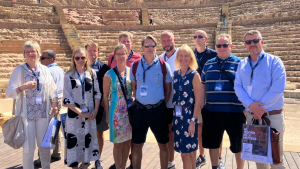
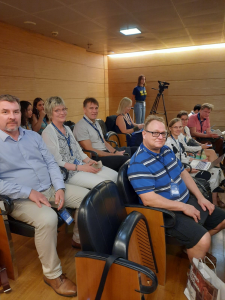
On September 28-30, the Univesidad Catolica San Antonio de Murcia (UCAM) hosted the 2022 EAS Annual Conference “A Holistic Approach to the Dual Career of the Student Athlete”. In being at the forefront of European Dual Career, UCAM participates in several ERASMUS+ Sport Partnerships, promoted a special issue in its scientific journal Cultura, Ciencia y Deporte, and is the University with the highest number of student-athletes winning medals at the Tokyo Olympic and Paralympic Games in 2021. At the Roman Theatre Museum of Cartagena, the Dean of the Faculty of Sport at UCAM Ms. Lourdes Meroño García, the President of EAS Ms. Laura Capranica, the President of the Organising Committee at UCAM Mr. Juan Alfonso García Roca, and the Delegate Councillor of Tourism of the Cartagena City Council Ms. Cristina Pérez Carrasco welcomed the participants.
Ms. Floor van Houdt (Head of Unit for Sport, DG Education, Youth, Sport and Culture) and Mr. David Kunst (Policy Officer for Evidence & Analysis, DG Employment, Social Affairs and Inclusion) presented online the opportunities for sports and employment at the European Commission, whereas Ms. Francine Hetherington Raveney (Deputy Executive Secretary of the EPAS) reported on the actions in the field of sports at the Council of Europe.

Dual career perspectives of the European Sports Organizations were offered by Mr. Andrej Pišl – Communications and Projects Manager at the European University Sports Association (EUSA); Mr. Philippe Housiaux – President of the European Fair Play Movement (EFPM); Ms. Teodora Pletosu – EU Affairs and Public Projects Specialist at Union of European Football Associations (UEFA). The dual career viewpoints of International Sports Organizations were provided by Mr. Kole Gjeloshaj – Director of Institutional and Educational Affairs at International School Sport Federation (ISF); Mr. Bill Thomson – Education Committee Member at International University Sports Federation (FISU) and Mr. Joerg Foerster – Chair Shareholder Committee Rhine-Ruhr 2025 FISU Games gGmbH; and Mr. David Cabello – Executive Board Member of the Badminton World Federation (BWF).

The EAS Conference was also the occasion for the signing of an important Memorandum of Understanding between the ISF and EAS on common dual career interests and close cooperation between the two organisations.
During the first session on dual career best practices and research, the 2022 Bengt Nybelius Scholarship has been awarded to Dr. Andrea Fusco from the University of Cassino and Lazio Meridionale, who presented research findings on dual career relocating elite coaches.
At the end of the first day, the participants contributed to the first workshop of the ERASMUS+Sport BRAnd Values Alignment through Dual Career (BRAVA-DC, 622824-EPP-1-2020-1-IE-SPO-SCP), which required to grade the importance and feasibility of 50 statements on the enhancement of the European workplace environment so the circumstances and challenges of dual career employee-sportspersons can more effectively be accommodated. 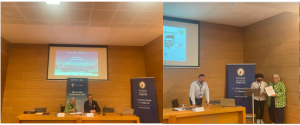
On the second day, the event was organized at the UCAM Cartagena Campus and was opened by Mr. Alejandro Leiva Arcas – Secretary of the Faculty of Sport, who reported the strategies and experiences for the promotion of Dual Career of student-athletes. Then, Mr. Sergio López Andújar (General Secretary of the Spanish Futsal Players Association, AJFS) moderated a round table with UCAM dual career athletes (Mr. Agassi Goantara – Indonesian International Basket Player), paralympic athletes (Mr. Gerard Descarrega – Paralympic 400m Gold Medalist; and Mr. Guillermo Rojo – International Athlete and Guide of Mr. Gerard Descarrega), and coaches (Antonio Peñalver – University Professor, International Athletics Coach, Decathlon Silver Olympic Medalist; and Mr. Rafael Alcaraz – International Taekwondo Coach of Olympic and Paralympic athletes).
A second workshop of the BRAVA-DC project was organized to allow the participants to group the 50 statements into categories in terms of meanings according to their individual logic. The expertise and knowledge of the participants in the first and second BRAVA-DC workshops have been considered very valuable in assisting during the development of European guidelines which support Dual Career in the workplace and facilitate appropriate brand alignment strategies and Corporate Social Responsibility policies.


During the annual General Assembly, Mr. Ole Keldorf, Secretary General, summarized the main activities and achievements of the organisation, as well as the financial results. Despite the 2019-2022 quadrennium presented several unexpected challenges, EAS managed to increase its activities organizing online cafès on different dual career aspects of the sportspersons, contributed to the finalization and progression of European ERASMUS+ Sport Partnerships, co-authored several scientific publications, and participated in European cultural and sports events. The delegates also elected the Board for the new 4-year mandate, confirming Ms. Laura Capranica (Italy) in the position of the President, and Ms. Mojca Doupona (Slovenia), Mr. Ole Keldorf (Denmark), Mr. Ilvis Abelkalns (Latvia), Mr. Antonio Sanchez-Pato (Spain), Ms. Laurence BONDEL (France), Mr. Antonio FIGUEIREDO (Portugal) as Members of the Executive Board, which is complemented by the permanent positions of Mr. Risto Keskitalo (Finland) and Mr. Tibor Kozsla (Hungary) as Founder and Honorary President, respectively.
The third day of the event took place in the Roman Theatre Museum of Cartagena and encompassed the second session dedicated to dual career best practices and research, and to Erasmus+Sport projects (e.g., SPRINGBOARD, Athlete Counsellors Against Match Fixing, ELCAMP, Para-limits).
Participants had plenty opportunities to interact and to exchange ideas for future dual career projects and collaborations during the conference breaks, lunches, dinners, the tour to the Roman Theater, and the Tourist Boat trip. The large delegation of Finnish Rectors and the Brazilian participants substantiated the EAS Conference as a crucial event to further develop a European dual career discourse in and beyond Europe.


On behalf of the EAS Board, President Capranica thanked the Organizing Committee and the UCAM staff for their amazing work in organizing such a grand final of the 2019-2022 quadrennium. The 2023-2026 quadrennium is already on the move, with the EAS Members looking forward to the 2023 and 2024 EAS Conferences to be held in Gaeta, Italy, and in Katowice, Poland, respectively.



On June 21 the seventh virtual EAS cafè focused on the dual career of paralympic athletes, which attracted more than 50 participants. Prof. Alejandro Leiva-Arcas, Deputy Director of the Faculty of Sport at UCAM moderated the event and presented the aims and progress of the ERASMUS+ project Dual Career of Student-Athletes with Disabilities as a Tool for Social Inclusion (Para-Limits, 622213-EPP-1-2020-1-ES-SPO-SCP) coordinated by the Catholic University of Murcia (UCAM), Spain, in cooperation with University Foro Italico of Rome (IT), UNEFS (RO), IPV (PT), University of Limerick (IE), COLLINN (NO), EAS Network (MT), the European Paralympic Committee (AT) and the FUNDACION ONCE (ES).
 As the first speaker, Lisa Gjessing presented her experience as a taekwondo athlete who underwent the amputation of her left arm. As a legal prosecutor for the Danish police and mother, Lisa described the opportunities provided by the paralympic sport and her challenges in managing her family life, and sport and working careers. She informed that Team Denmark and ESAA offer the same support to Olympic and Paralympic athletes, as well as sponsorships and working flexibility. Furthermore, in case the para-athlete decides to reduce the working hours, her/his salary is maintained with integration from the sports organization. Despite this favourable environment, the para-athlete has to make choices to establish priorities and to manage changes in their programme, especially to manage the parental role.
As the first speaker, Lisa Gjessing presented her experience as a taekwondo athlete who underwent the amputation of her left arm. As a legal prosecutor for the Danish police and mother, Lisa described the opportunities provided by the paralympic sport and her challenges in managing her family life, and sport and working careers. She informed that Team Denmark and ESAA offer the same support to Olympic and Paralympic athletes, as well as sponsorships and working flexibility. Furthermore, in case the para-athlete decides to reduce the working hours, her/his salary is maintained with integration from the sports organization. Despite this favourable environment, the para-athlete has to make choices to establish priorities and to manage changes in their programme, especially to manage the parental role.
 A different perspective was provided by the Italian Flatwater Sprint Paracanoe Kayaker and Paralympic medallist in Tokyo, Federico Mancarella. Having experienced a disability from his birth, Federico started being engaged in the sport when he was a student. Considering that canoeing requires expensive equipment and long travelling to reach the training and competitive sites, the parents often represent the only support providers. Furthermore, the working sector lacks a dual career culture, so the athletes have to consider dropping out of sports or their working career, which was actually his situation when he fired himself to prepare for the Tokyo Paralympics. Furthermore, parasports do not attract sponsorships because of limited media attention. Federico also envisaged some solutions, including working flexibility, economic support from the public and private sectors, and structured support.
A different perspective was provided by the Italian Flatwater Sprint Paracanoe Kayaker and Paralympic medallist in Tokyo, Federico Mancarella. Having experienced a disability from his birth, Federico started being engaged in the sport when he was a student. Considering that canoeing requires expensive equipment and long travelling to reach the training and competitive sites, the parents often represent the only support providers. Furthermore, the working sector lacks a dual career culture, so the athletes have to consider dropping out of sports or their working career, which was actually his situation when he fired himself to prepare for the Tokyo Paralympics. Furthermore, parasports do not attract sponsorships because of limited media attention. Federico also envisaged some solutions, including working flexibility, economic support from the public and private sectors, and structured support.
In summarizing the major themes discussed during the Cafè, Prof. Alejandro Leiva-Arcas underlined that the Para-limits project will indicate guidelines for the advancement of dual career policies for paralympic athletes, as well as the need to educate tutors for this special population. Finally, he presented the website of the 2022 EAS Annual Conference to be held in Cartagena, Spain, next September 28-30: http://eventos.ucam.edu/85445/tickets.html
He highlighted that the early bird deadline is August 28 (http://eventos.ucam.edu/85445/section/38290/eas-conference-2022.html), whereas the deadline for the call for abstracts is August 31 (http://eventos.ucam.edu/85445/section/38291/eas-conference-2022.html). Finally, young researchers could apply to the Bengt Nybelius Scholarship before July 1 https://www.dualcareer.eu/call-for-papers-bengt-nybelius-scholarship-2022/.
The Eight EAS Cafè will be organized in Fall 2022.
Have a nice summer and see you in Cartagena.

Zoom Meeting June 21, 2022 (from 12:00 CET)
12:00 Welcome
Prof. Alejandro Leiva-Arcas, PhD – Deputy Director of the Faculty of Sport at UCAM; Member of the Erasmus+ Para-limits project.
12:10 The Danish Paralympic structure and my personal Dual Career strategy on the way to the medals
Prof. Lisa Gjessing is a Danish Paralympic gold medalist in taekwondo in Tokyo 2020, four-time world champion and three-time European champion, and one of the flag bearers for Denmark during the opening ceremony of the 2020 Summer Paralympics. She graduated in law and works as a prosecutor for the Danish police.
12:30 My dual career experience as a student and worker
Federico Mancarella is an Italian Flatwater Sprint Paracanoe Kayaker, bronze medalist in Tokyo 2020, World and European medalist. He graduated in Business and worked for international bank companies till he quit his job to prepare for the Paralympic Games.
12:50 General discussions
13:00 Concluding Remarks and announcement of the next EAS Annual Conference (September 28-30, Cartagena, Spain)

Europe is going through difficult and disruptive times, with the alarming humanitarian crisis continuing to evolve and COVID-19 pandemic still limiting personal interactions. Indeed, Easter is the time of renewal through considering our real values and appreciating what can enrich our lives. In these exacerbated and disastrous social tensions, sports and education could be examples of collective efforts to recover and look forward a re-start with new strength, humanity, and openness after these calamities. In this framework, EAS is committed to keep sustaining the dual career of sportspersons and working hard on ERASMUS+Sports Collaborative Partnerships and forthcoming initiatives, including the organization of the 2022 Annual Conference and General Assembly to be held in Cartagena, Spain next September 28-30.
Recent activities
Driven by the aims of the Network, in the past months EAS carried out several virtual activities to support a fruitful exchange in dual career between institutions, experts, and policy makers across Europe. In particular, the bimonthly online Cafè were dedicated to “Well-being and mental health for Dual Career athletes at high school level” and “Dual Career service providers”, which had been greatly participated and appreciated. The next Cafè will be organized in May-June and will focus on the paralympic student-athletes.
Create skill enhancement opportunities for people who are working in the field of dual career
The 2017 (e.g., EMPATIA) and 2018 (e.g., DONA, ED MEDIA, MTG, and SoS) Erasmus+ Cooperative Partnerships have been finalized and their outcomes are available at the ERASMUS+PROJECT RESULTS platform (https://erasmus-plus.ec.europa.eu/projects#search/project/keyword=sports%2520opens%2520school&matchAllCountries=false), whereas the STARTING11 Final Conference will be held in Amsterdam next May 12. In addition to online activities of the 2020 BRAVA-DC, Para-limits, and ElCAMP Erasmus+ Cooperative Partnerships, EAS participated to the face-to-face transnational meetings organized in Oslo and in Cartagena for ElCAMP, and in Rome for Para-limits. Furthermore, the Collaborative Partnership COMPATH has been granted 2021 Erasmus+ funds for the next years. Finally, EAS participated to the 2022 call of the Erasmus+Sport.
Build up academic research work in the field of dual career.
This year, a scientific manuscript on the outcomes of the More Than Gold project has been published (https://journals.plos.org/plosone/article?id=10.1371/journal.pone.0264175) and the last paper of the EMPATIA project is currently under revision. To support young researchers in dual career, before July 1st, 2022, applications for the 2022 Bengt Nybelius Scholarship have to be submitted to info@dualcareer.eu, encompassing the curriculum vitae of the first author and his/her original manuscript. The winner will have to summarize her/his work with a 15-minute oral presentation in English at the 2022 Annual EAS Conference in Cartagena, Spain, September 28-30. Further information is available at https://www.dualcareer.eu/call-for-papers-bengt-nybelius-scholarship-2022/
Create a political environment that addresses the needs of talented athletes pursuing a dual career by cooperating with partners in sport and educational systems
Fruitful partnerships with the European Commission and the Council of Europe have been consolidated through the participation in relevant events held, mainly organized in online modalities. Next May 18, 2022 EAS will participate to the School Sport Forum of the ISF Gymnasiade, to be held in Normandy, France. These activities will consolidate and enhance a political environment that addresses Dual Career issues in sport and educational systems.
EAS is inviting you to follow its official website and social media to keep informed on the ongoing activities. We greatly value your contribution to the European Dual Career culture, and we will be happy to disseminate your activities.
Save the date
May 12, 2022 – STARTING11 Final Conference (https://starting11.eu/conference/).
September 28-30, 2022 – EAS Annual Conference and General Assembly, Cartagena, Spain (https://www.dualcareer.eu/wp-content/uploads/2022/04/EAS-Annual-Conference_flyer.pdf)
We wish you and your loved ones all the best for health and peace.
On behalf of the EAS Executive Committee
Laura Capranica
President
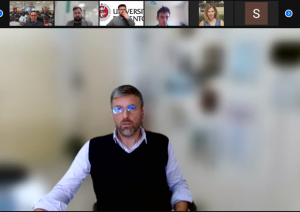
On March 24 the sixth virtual EAS cafè focused on the good practices and opportunities for dual career service providers. Antonino Bianco, Professor of Sports Sciences and Deputy Dean for International Relations at the University of Palermo moderated the event offering good practices at the Catholic University of Murcia (UCAM), Spain, and future educational opportunities for dual career service providers through the ERASMUS+Sport Collaborative Partnership STARTING11 platform.
The outstanding dual career approach at UCAM was illustrated by Prof. Antonio Sanchez-Pato and Prof. Alejandro Leiva-Arcas, Dean and Deputy Director of the Faculty of Sport at UCAM, respectively. Since 2011, UCAM established a solid dual career service for 425 Spanish athletes as students (males 55%, females 45%) competing in 35 different sports disciplines and cooperated in more than ten ERASMUS+Sport Collaborative Partnerships in dual career. In particular, during the last two Summer Olympic and Paralympic Games, UCAM Student-athletes won 24 (Rio 2016: 15 Olympic, 9 Paralympic) and 27 (Tokyo 2020: 20 Olympic, 7 Paralympic) medals. The dual career programme at UCAM is based on four pillars: Recruitment, Administrative assistance, Academic support, and Research development. Recruitment provides 90% full scholarships and 10% discount fees (range 20-50%), including a possibility to extend the scholarship to family members in case of relocation. Whilst the administrative assistance is managed by an academic manager helping with administrative issues and financial support, the academic support involves both professors and students with mentoring and study buddy roles, respectively. Through Research, UCAM approaches dual career as an ongoing laboratory and establishes cooperation with several academic institutions and sport bodies. In fact, in 2015 UCAM published the handbook “An Innovative European Sports Tutorship Model of the Dual Career of Student-Athletes” (https://erasmus-plus.ec.europa.eu/projects/eplus-project-details#project/603346-EPP-1-2018-1-LV-SPO-SCP), in 2021 a special issue on Dual Career of the peer-review journal of UCAM “Cultura, Ciencia y Deporte” encompassing 11 international scientific contributions (https://ccd.ucam.edu/index.php/revista/issue/view/87), and in 2022 the Guidelines to Promote the Dual Career of Athletes-Students (Methodology for Universities and Manual for Authorities) within the More Than Gold ERASMUS+Sport Collaborative Partnership (https://erasmus-plus.ec.europa.eu/projects/eplus-project-details#project/603346-EPP-1-2018-1-LV-SPO-SCP). Finally, UCAM will host in Cartagena, Spain, the 2022 EAS Annual Conference and General Assembly next September 28-30.
Dennis van Vlaanderen and Wolfgang Stockinger Manager of Elite Sport & Education at the Amsterdam University of Applied Science and CEO of TW1N illustrated the educational platform for dual career service providers developed within the ERASMUS+Sport Collaborative Partnership STARTING11 to facilitate the implementation and professionalize dual career practice at sport, education and the labour market levels. In having in mind the needs of the dual career practitioner and supporter, the ready-made and fully customizable digital tools pertains three main service areas: Manage, Train, and Counsel. In particular, the manage area helps building the political, theoretical and infrastructural know-how to implement and administrate dual career services as well as to efficiently communicate towards the most relevant dual career stakeholders. The train aims to prepare, sensitize and empower athletes by providing them with knowledge, inspiration and skills to successfully pursue their dual careers. The Counsel area intends to professionalize interpersonal counselling services to foster the coping, decision-making and planning capability of athletes during career transitions. At the end of their presentation, Dennis van Vlaanderen and Wolfgang Stockinger invited the participants to attend the STARTING 11 Final Conference at the Amsterdam Olympic Stadium next May 12, 2022. The Event will allow to explore the European Dual Career Toolkit first-hand, to attend presentations and workshops of international dual career experts and high-performance athletes, and to network with like-minded professionals from across Europe. The link for further information and registration ihttps://starting11.eu/conference/.
After the general discussion, Prof. Bianco complimented with the speakers and especially appreciated the outputs of their Collaborative Partnerships, which provide useful material freely accessible online for the benefit of dual career service providers.
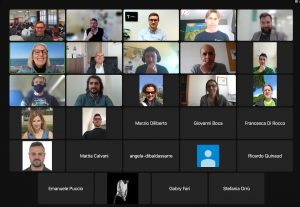
On December 10, 2021, the fifth virtual EAS cafè addressed the support of dual career high school athletes especially during the critical pandemic situation. Masar Gjaka, winner of the 2018 Bengt Nybelius award and currently Dean of the Faculty of Sport and Movement Science, UBT College, Pristina, Kosovo, moderated the event, which offered Italian, Slovenian, and Danish approaches and experiences, as well as an opportunity to envisage future actions and visions in dual career of talented athletes.
Paola Deiana, Director of the Office V, Italian Ministry of Education, presented the development of the experimental dual career high school programme, which was introduced in 2015 and currently involves more than 1500 schools, 5000 tutors, and 14000 athletes meeting the requirements established by the Italian Olympic Committee, Italian Paralympic Committee and the Italian Sports Federations. Despite its positive trend, this programme involves a lower number of female athletes with respect to male athletes and a low percentage of Paralympic athletes with respect to their Olympic counterparts. Paola Deiana anticipated that the Italian Ministry of Education is envisaging an extension of the programme to all the Italian schools, from the primary schools to the universities, and an equity for gender and capabilities. Furthermore, she highlighted the need of an innovative educational approach, which should be effective in providing knowledge with a reduced live-teaching time and encompassing sports issues in the different topics of high school curricula.
Jožef Križaj, Assistant Professor and Head of the Postgraduate Doctoral Studies Department at the Faculty of Sport University of Ljubljana, Slovenia, gave a contribution as a researcher and as a parent supporting the dual career of elite youth athletes. He illustrated the dual career programme at the Slovenian high schools and presented some challenges youth athletes faced during the COVID-19 lockdown. In particular, he disclosed the results of a national research, which highlighted differences between athletes of individual and team sports, the latter suffering more the negative effects of lockdown for missing group training sessions and weekly competitions. Jožef Križaj urged particular attention to adolescent athletes to prevent pandemic-related sport dropouts and to sustain a proper development of sport skills during the post-pandemic time. This concern is especially evident after the past two years and can heavily affect the sports system in a near future.
Ole Keldorf, Head of Sport at the prestigious Elite Sports Academy of Aarhus (ESAA), Denmark, and member of the EAS Executive Board, gave a precious contribution to the debate in presenting the pandemic-related critical aspects observed in Danish youth athletes. Data from the ESAA observatory suggest that dual career actors should place particular attention to the talented youth athletes’ perception and attitudes towards sports, life, and wellbeing. He claimed that the European dual career culture should consider particularly relevant the mental health of youth athletes and offered the ESAA survey as a valuable example of dual career best practice for monitoring the wellbeing of athletes as students. In fact, the systematic collection of athletes’ perceptions regarding their sports enjoyment, recovery, and social aspects could be crucial not only to prevent sport disengagement and dropouts but also to foreseeing new avenues for sport development. Ole Keldorf also called for a cooperation between countries to share possible solutions to the challenges posed by this pandemic situation.
In considering the call for the Next Decade of European Education through a cooperation between educational institutions in different countries (https://ec.europa.eu/education/summit/next-decade-european-education_en ), members of the EAS community were invited to be proactive in establishing innovative collaborative partnerships in dual career for high school athletes.
The fifth EAS Virtual Cafè attracted around 60 European dual career experts and will come back on February 2022.


On September 20-22 the 2021 EAS Annual Conference was organized in Lisbon, Portugal, by the University Institute of Lisbon – ISCTE. The three-day event was organized in a blended format, with 40 participants from 12 different countries in the presence and others attending online.
On September 20, the Conference focused on Dual Career Policies, with Vítor Pataco reporting on the 2021 Portuguese EU Presidency, and Mojca Doupona describing the ongoing activities of the Slovenian EU Presidency.
In the afternoon, the session was dedicated to dual career best practices in different settings and countries.
On September 21, the morning session focused on Dual Career in football and was hosted at the City of Football in Oeiras, home to the Portuguese Football Federation.
At the beginning of the last day, the final event of the EMPATIA ERASMUS+ Sport Programme took place.
Laura Capranica thanked Duarte Nuno Lopes, Tiago Samuel da Silva, and ICSTE for their courage, efforts, and hard work in organizing such a tremendous 2021 EAS Conference despite the day-by-day challenges posed by COVID-19 pandemic and invited the EAS Members to attend the 2022 EAS Annual Conference in Spain.


To disseminate the outcomes of the EU Collaborative Partnership “More Than Gold’ (603346-EPP-1-2018-1-LV-SPO-SCP)”, the fourth EAS Virtual Cafè attracted around 50 European dual career experts.
Raluca Mihaela Onose, lecturer at the Alexandru Ioan Cuza University of Iasi, Romanian Partner of the More than Gold Project, moderated the contributions of Nuno Laurentino and Paolo Bouquet. They presented the vision and organization of dual career in Portugal and Italy, respectively.
As a former Olympic swimmer in 1996 and 2000, Vice-President of the Portuguese Swimming Federation, and member of the Olympic Athletes’ Commission, Mr Laurentino is currently Deputy of the Secretary of State for Youth and Sport, which strongly supports a dual career in Portugal. He illustrated the origin, evolution and successful outcomes of the dual career at the Portuguese high school level, which represents a recognized best practice also at the international level. Mr Laurentino also presented the new challenges to enhance dual career paths at the university level, necessary to meet the recent national law supporting dual career at tertiary education.
Prof. Paolo Bouquet illustrated the three-level dual career programme at the Italian University of Trento, which considers sports as an opportunity for the academic community at large. In particular, this university will be involved in the 2026 winter Olympics, which represent a tremendous chance for the development of the whole region and innovative approaches in and through sports. In this vein, the University of Trento organized the Italian network of universities interested in sports issues. Specific to dual career, the official website of the UNISPORT Italia allows student-athletes to filter according to their expectations and needs the dual-career programmes offered at Italian higher institutions.
Towards the end of the event, the 18th EAS Annual Conference to be held face-to-face in Lisbon next September 20-23, 2021, was presented and participants were invited to submit abstracts on dual career activities.
THE 2021 EAS CAFè will come back In the fall term.